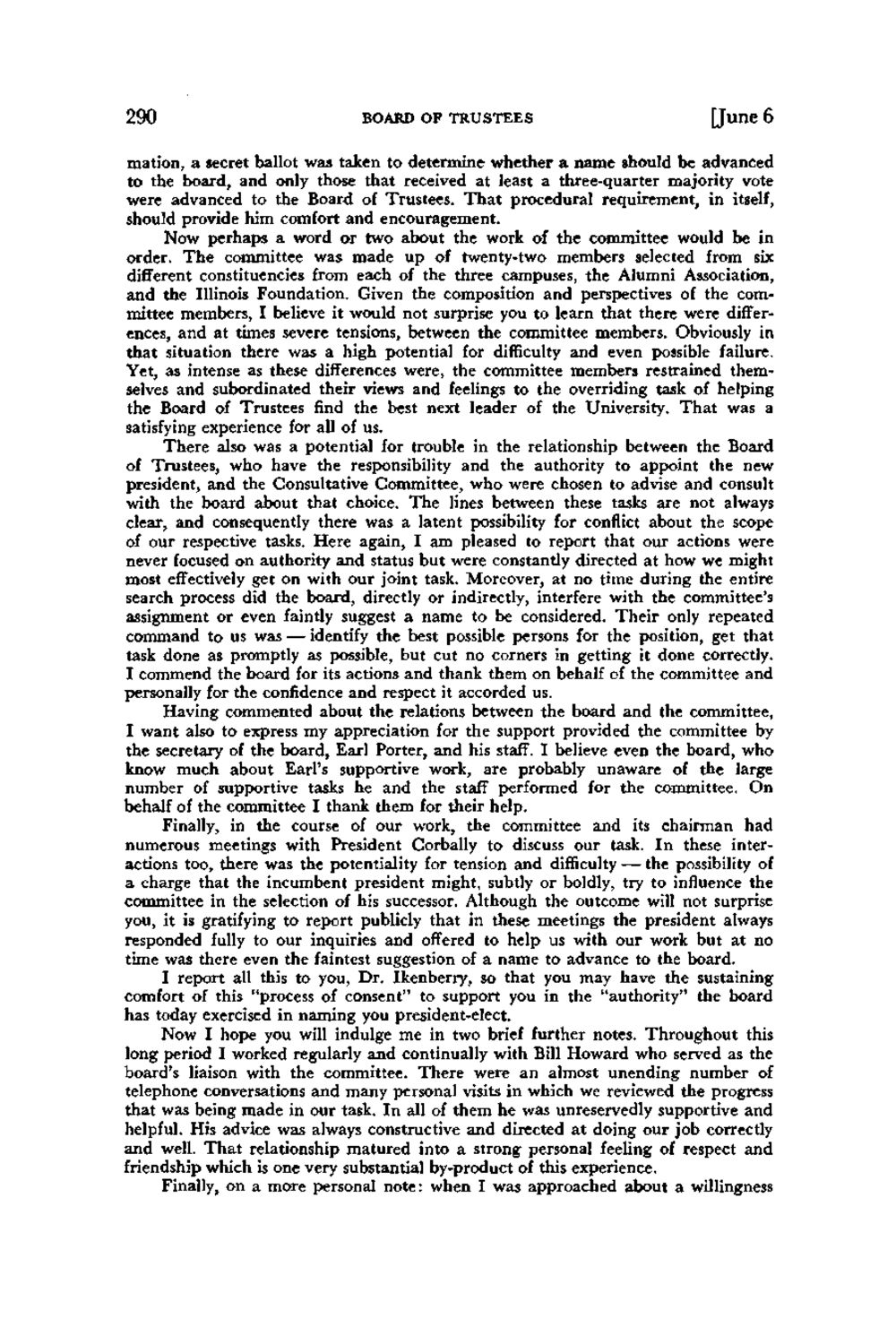| |
| |
Caption: Board of Trustees Minutes - 1980
This is a reduced-resolution page image for fast online browsing.

EXTRACTED TEXT FROM PAGE:
290 BOARD OF TRUSTEES [June 6 mation, a secret ballot was taken to determine whether a name should be advanced to the board, and only those that received at least a three-quarter majority vote were advanced to the Board of Trustees. T h a t procedural requirement, in itself, should provide him comfort and encouragement. Now perhaps a word or two about the work of the committee would be in order. T h e committee was made u p of twenty-two members selected from six different constituencies from each of the three campuses, the Alumni Association, and the Illinois Foundation. Given the composition and perspectives of the committee members, I believe it would not surprise you to learn that there were differences, and at times severe tensions, between the committee members. Obviously in that situation there was a high potential for difficulty and even possible failure. Yet, as intense as these differences were, the committee members restrained themselves and subordinated their views and feelings to the overriding task of helping the Board of Trustees find the best next leader of the University. That was a satisfying experience for all of us. There also was a potential for trouble in the relationship between the Board of Trustees, who have the responsibility and the authority to appoint the new president, and the Consultative Committee, who were chosen to advise and consult with the board about that choice. The lines between these tasks are not always clear, and consequently there was a latent possibility for conflict about the scope of our respective tasks. Here again, I am pleased to report that our actions were never focused on authority and status but were constantly directed at how we might most effectively get on with our joint task. Moreover, at no time during the entire search process did the board, directly or indirectly, interfere with the committee's assignment or even faintly suggest a name to be considered. Their only repeated command to us was — identify the best possible persons for the position, get that task done as promptly as possible, but cut no corners in getting it done correctly. I commend the board for its actions and thank them on behalf of the committee and personally for the confidence and respect it accorded us. Having commented about the relations between the board and the committee, I want also to express my appreciation for the support provided the committee by the secretary of the board, Earl Porter, and his staff. I believe even the board, who know much about Earl's supportive work, are probably unaware of the large number of supportive tasks he and the staff performed for the committee. On behalf of the committee I thank them for their help. Finally, in the course of our work, the committee and its chairman had numerous meetings with President Corbally to discuss our task. I n these interactions too, there was the potentiality for tension and difficulty — the possibility of a charge that the incumbent president might, subtly or boldly, try to influence the committee in the selection of his successor. Although the outcome will not surprise you, it is gratifying to report publicly that in these meetings the president always responded fully to our inquiries and offered to help us with our work but at no time was there even the faintest suggestion of a name to advance to the board. I report all this to you, Dr. Ikenberry, so that you may have the sustaining comfort of this "process of consent" to support you in the "authority" the board has today exercised in naming you president-elect. Now I hope you will indulge me in two brief further notes. Throughout this long period I worked regularly and continually with Bill Howard who served as the board's liaison with the committee. There were an almost unending number of telephone conversations and many personal visits in which we reviewed the progress that was being made in our task. I n all of them he was unreservedly supportive and helpful. His advice was always constructive and directed at doing our job correctly and well. T h a t relationship matured into a strong personal feeling of respect and friendship which is one very substantial by-product of this experience. Finally, on a more personal note: when I was approached about a willingness
| |